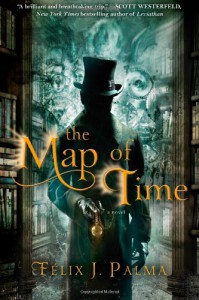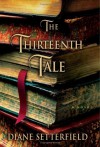The Map of Time

Perhaps the thing that can best sum up the experience of reading The Map of Time is that I couldn't for the life of me figure out what bookshelves I should put it on. Is it fantasy? Is it science fiction? Is it historical fiction? It's not Victorian, even though the entire thing takes place there. If I had a time travel shelf, I don't even think it would properly go there, because actual time travel doesn't show up until the last fifty pages. I ended up with "speculative" because it's sort of a genre catch-all, and "post-modern" because, well, you'll see.
The Map of Time is narrated by an omniscient narrator who frequently makes sly meta-fictional references to the fact that he knows everything about all of his characters, while they only know what their limited perspectives can tell them. This makes us and the narrator into god-like figures, the point of which seems to be that Palma is questioning the nature of reality itself. The first 2/3 of the book focus characters that are duped into believing in fantastic things, but are much happier for it. In section one, H.G. Wells helps to convince a young man not to commit suicide by perpetrating a hoax wherein the young man believes he has traveled back in time to save the life of his lover, who had been murdered by Jack the Ripper eight years before. We are just as convinced by this hoax as the young man is, until the narrator lets us in on the secret. From that point on, you can't help but question as you read, what else is just an illusion? What's really going on here? At one point, H.G. Wells -- who is the book's most identifiable protagonist -- says, "I saved a man with my imagination." And that is really the heart of the book: What does it matter if "reality" is just an illusion, if someone's life is the better for having believed in it?
But then Palma kind of turns all of that on its head in the third section, when it turns out that time travel is possible, only not in the way we thought. Not only is the last section kind of rushed (it in itself could have made up an entire novel, completely ignoring the other two sections), but for me it calls into question the point of the other two sections. Both were leisurely and absorbing, focusing on character rather than plot. Part three is all plot, except for one crucial scene where H.G. Wells has to make a choice. And it's there I suppose that Palma wants us to find the answer. Wells chooses not to do something that will in effect prevent time travel from ever being possible. He willingly chooses a world where time travel is only an illusion. It made sense at the time, but days from finishing it, I can't for the life of me remember why he did this. As a result, the end felt . . . unfinished. The meta narration also became sort of problematical at the end, not because I felt it was cutesy or too melodramatic (a word, not coincidentally, that Palma himself chooses to apply to the events of his novel), but because it made me focus on what the book was not (or what it was trying to be) rather than what it actually was. At one point, the narrator contemplates what makes a good piece of literature, and all I could think in that moment as a result was that the piece of fiction I was currently reading didn't even live up to it's own expectations. Perhaps he should have left that part out.
All in all, though, I would recommend this book. For all its problems, it's a very engaging read that definitely makes the old cogs churn, and most of the character are very well drawn and likable, even when they're not doing likable things. (I do regret that I couldn't read it in its original Spanish, however. Some of the translator's language reads as overly blown, like he was trying too hard with too little talent to back himself up. I can easily imagine the same phrases being lyrical and inventive in the original text.)




